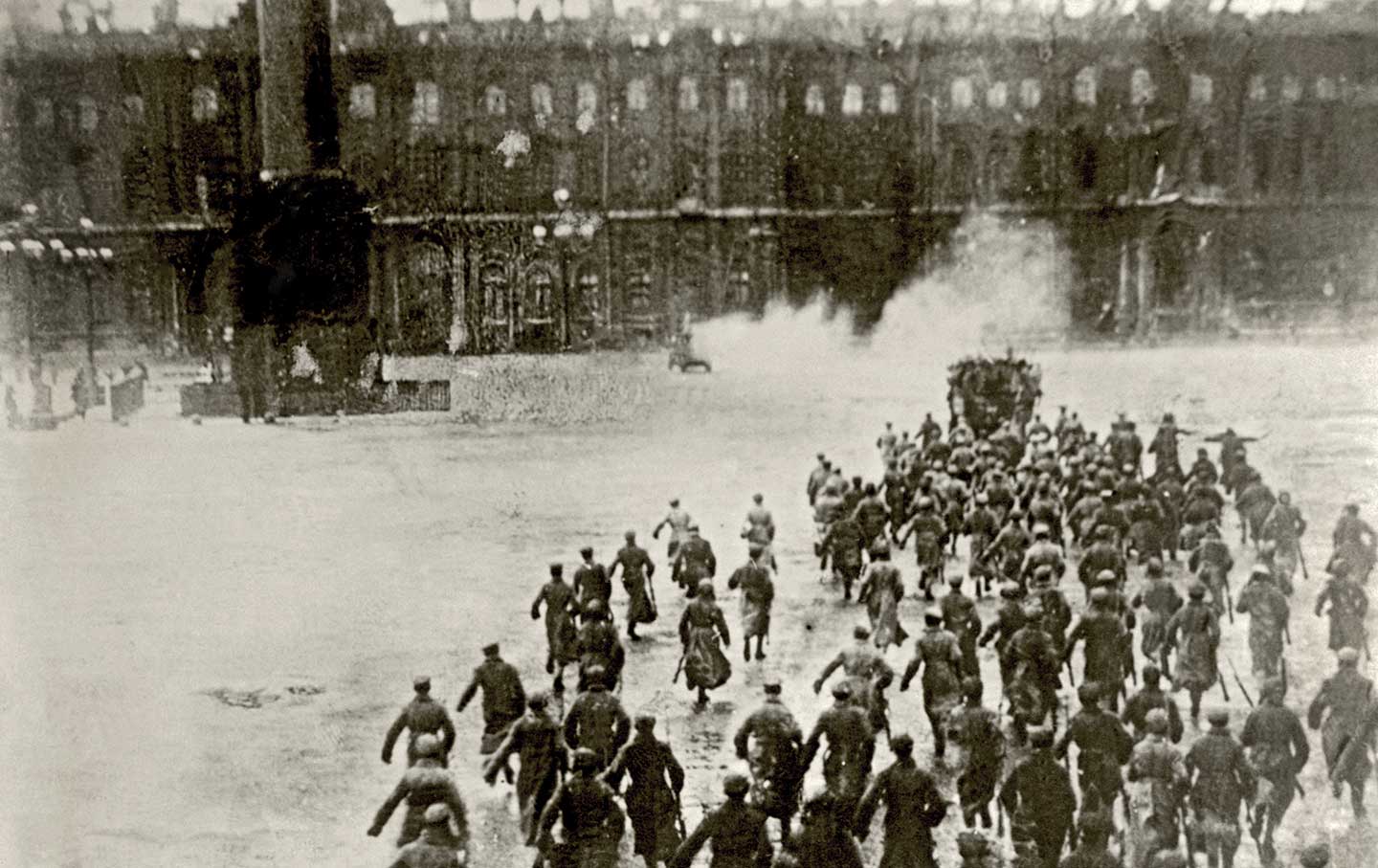Reckoning With the Election Results
What went wrong—and what we have to do now.

In a democracy, elections are more than just vote-counting exercises or contests between candidates. They are a kind of collective dream, drawing on disparate sources whose logic and meaning can be difficult to interpret. And as Freud reminded us over a century ago, dreams are always overdetermined—born from multiple causes, which in turn generate a variety of effects.
Even now, with time to at least begin to digest the results, the most honest answer to “What happened on November 5?” is probably a list. Waleed Shahid, an activist in the Uncommitted campaign (and a member of The Nation’s editorial board), published a helpful summary of 10 different genres of explanation on his Substack. A cousin of mine in DC outdid him, e-mailing her running tally of 20:
• Inflation
• Immigration
• Racism
• Sexism
• Rejection of incumbents/Biden’s unpopularity
• Anger
• Wealth inequality
• Disinformation/right-wing echo chamber
• White supremacy
• Transphobia
• Culture wars (woke-ism, DEI)
• Democratic elitism
• Ineffective channels of communication (more Joe Rogan,
less Taylor Swift)
• “Witch hunt” prosecutions of Trump
• International movement to the right
• Gaza
• Lateness of Biden’s withdrawal
• Lack of time to get to know Harris/vagueness of her answers
• Lack of a competitive primary
• Selection of Tim Walz as running mate
Your mileage may well vary; like the interpretation of dreams, reading the political runes is far from an exact science. But as a vulgar materialist, my own instincts tend toward the Democratic Party’s persistent failure to address the economic consequences of the globalization so enthusiastically embraced by Bill Clinton and his successors, and (given the radically compressed timeline of the Harris campaign) the colossal waste of time and resources pursuing the chimera of massive Republican defections rather than addressing the party’s own supposedly working-class base. (I put it that way since in the 48 percent of the electorate with family incomes between $30,000 and $100,000 a year, Republicans now appear to have the advantage.)
If you still have an appetite for postmortems, I heartily recommend Aditya Chakrabortty’s analysis in The Guardian, which points out that while Trump and the Republicans offered a populism of the right (“Your economic pain is real. Immigrants and the Democrats are to blame”), Democrats “have served up an anti-populism: telling voters they were wrong.” Above a truly stunning graph showing average hourly wages for blue-collar workers in the United States, Chakrabortty notes that
for the vast majority of US employees—whether middle class or working class, teacher or shop assistant—wages have flatlined. Not for four or even 20 years—but for most of the past half century. Strip out inflation, and average hourly earnings for seven out of 10 employees have barely risen since Richard Nixon was in the White House.
As he explains, if you start from an oligarchy where, while the rich get steadily richer, “most workers only get by because of low gas and food prices,” and then add a hefty measure of post-Covid inflation, the recipe for conflagration is complete.
At least this time, Nation readers had plenty of reason to distrust the Democratic National Committee’s optimistic pronouncements. Cozily campaigning with the Cheneys, we warned, was likely to alienate as least as many potential voters as it attracted. Likewise, as Jeet Heer noted, giving Trump and Vance a clear lane to masquerade as the anti-war candidates. Joan Walsh raised red flags over the falloff in enthusiasm, energy, and (particularly among younger voters) turnout in Georgia. John Nichols underlined Bernie Sanders’s and Shawn Fain’s increasingly desperate attempts to get Harris and Walz to return to the economic populism—and clear appeal to working-class voters—they had embraced in Chicago (only to abandon it in favor of attacks on Trump’s character once the big donors weighed in). As for the Democrats’ refusal to allow a single Palestinian elected official to speak at the convention—and Harris’s failure to show even Hubert Humphrey’s too-little-and-too-late independence from the administration’s pathologically persistent embrace of Israel’s ongoing genocide in Gaza—don’t get me started. Anyone who read the unhinged memo by Harris’s campaign chief from the Wilmington bunker on election night knew that it was all over but the counting.
This, it seems, is what democracy looks like: Donald Trump in the White House, Republicans in control of the Senate and the House, and, with their 6–3 majority on the Supreme Court, little prospect of any institutional check or balance. In such circumstances, the debate over whether or not this amounts to a mandate is, in my view, a distraction. What they have is power.
NOW WHAT?
And what do we have? We have each other. Eight years ago, in these very pages, I wrote:
Despite the temptation to mourn, we have to organize. Because if we can’t rely on the president, or the Congress, or the courts, we have no choice but to rely on one another. Not just for comfort but for strength—and survival.
But I also wrote that “there will be a time for recriminations.” Deferred first by the glacial deliberations of the Mueller investigation, and then through the futile pursuit of Russiagate phantoms, and yet again by the unity required to defeat Trump in 2020, that time has now arrived. These people had one job: keep Donald Trump out of the White House. And they blew it. Twice. And can anyone really doubt that were it not for the pandemic, they would have failed four years ago too?
These were the people who decided to send Bill Clinton—the Democrat most closely associated with NAFTA and the end of secure, high-wage blue-collar employment—to Michigan to rally working-class voters. Where, just to add insult to injury, he decided to lecture Arab voters on the historical primacy of the Jewish claim to “Judea and Samaria.” So go ahead and take a breath, a break from watching the news—even a short vacation, if you can. Spend time with the people you love and give yourself time to grieve. But then get ready to roll up your sleeves, because before there can be a revival, there really does need to be a reckoning.
Popular
“swipe left below to view more authors”Swipe →Chuck Schumer, who in 2016 blithely declared that “for every blue-collar Democrat we lose in western Pennsylvania we will pick up two moderate Republicans in the suburbs in Philadelphia, and you can repeat that in Ohio and Illinois and Wisconsin,” should now have the decency to resign before he can lead the party to defeat again. As for the Democratic consultants, they will need to be driven out. As will the dispensers of dark money, since—as Zephyr Teachout writes in this issue—to keep on building “a tent big enough for tech oligarchs and private equity” is a formula for serial defeat.
Instead, we need to revive and renew what Howard Dean called “the Democratic wing of the Democratic Party”: trade unions, tenant associations, grassroots community organizations, as well as all of the groups concerned with preserving fundamental rights and protecting the most vulnerable among us, from the ACLU to the NAACP, from Moms Demand Action to Planned Parenthood, from Make the Road to the Sunrise Movement.
But we’re also going to have to start playing defense, effectively and immediately. The steady drumbeat of Trump’s cabinet nominations, one more outrageous than the next (a friend called it “government by shitposting”), is clearly intended to demoralize as well as distract us. We simply can’t afford to let that happen. Because in our country, in our cities, and in our neighborhoods—and in neighborhoods from Palestine to Port au Prince—there are human beings in immediate peril, who need our help, our energy, and our solidarity.
We will have to pick our battles. Conserve our strength. And be strategic. In many cases, the front lines of any effective opposition will shift to the states. Illinois Governor JB Pritzker’s declaration that “You come for my people—you come through me” was a heartening sign that some elected officials are already rising to the challenge. Likewise Connecticut Senator Chris Murphy’s call to “rebuild the left”—and his unabashed use of the words “the left.” Meanwhile, the siren song of “normalization” can already be heard in the media, and we’ll need to resist that as well.
But given Trump’s rhetoric and what we’ve seen of his temperament, we also need to prepare ourselves for repression—and resistance. In 2016, I wrote: “The next four years will test our country—and our movement—like nothing else we have seen in our lifetimes.”
You probably thought we’d passed that test—I certainly did—and yet here we are again. The Talmud tells us that while we “are not obligated to complete the work, neither are we free to abandon it.” Welcome back to the fight.

D.D. Guttenplan
Editor
We cannot back down
We now confront a second Trump presidency.
There’s not a moment to lose. We must harness our fears, our grief, and yes, our anger, to resist the dangerous policies Donald Trump will unleash on our country. We rededicate ourselves to our role as journalists and writers of principle and conscience.
Today, we also steel ourselves for the fight ahead. It will demand a fearless spirit, an informed mind, wise analysis, and humane resistance. We face the enactment of Project 2025, a far-right supreme court, political authoritarianism, increasing inequality and record homelessness, a looming climate crisis, and conflicts abroad. The Nation will expose and propose, nurture investigative reporting, and stand together as a community to keep hope and possibility alive. The Nation’s work will continue—as it has in good and not-so-good times—to develop alternative ideas and visions, to deepen our mission of truth-telling and deep reporting, and to further solidarity in a nation divided.
Armed with a remarkable 160 years of bold, independent journalism, our mandate today remains the same as when abolitionists first founded The Nation—to uphold the principles of democracy and freedom, serve as a beacon through the darkest days of resistance, and to envision and struggle for a brighter future.
The day is dark, the forces arrayed are tenacious, but as the late Nation editorial board member Toni Morrison wrote “No! This is precisely the time when artists go to work. There is no time for despair, no place for self-pity, no need for silence, no room for fear. We speak, we write, we do language. That is how civilizations heal.”
I urge you to stand with The Nation and donate today.
Onwards,
Katrina vanden Heuvel
Editorial Director and Publisher, The Nation
More from The Nation
A Popular Opinion A Popular Opinion
The Nation has long opposed the Electoral College.

Congresswoman Barbara Lee on Why Shirley Chisholm Was Right Congresswoman Barbara Lee on Why Shirley Chisholm Was Right
The California Democrat explains why, during her 25 years in Congress, it was important for her “to disrupt and dismantle and build something that’s equitable and just and r...

What’s—Still—the Matter With Kansas? What’s—Still—the Matter With Kansas?
As recent events bear out, when Thomas Frank lamented, “We’ll have to drag the Democrats kicking and screaming to victory" in 2017, if anything he was understating the challenge.

The Impossible Story of Commumism The Impossible Story of Commumism
How do you tell the history of a global movement in all its hope and contradiction?

The Democrats Will Keep Losing Until They Solve Their Plutocracy Problem The Democrats Will Keep Losing Until They Solve Their Plutocracy Problem
The party’s habitual deference to big donors makes it impossible to effectively oppose Trumpism.



